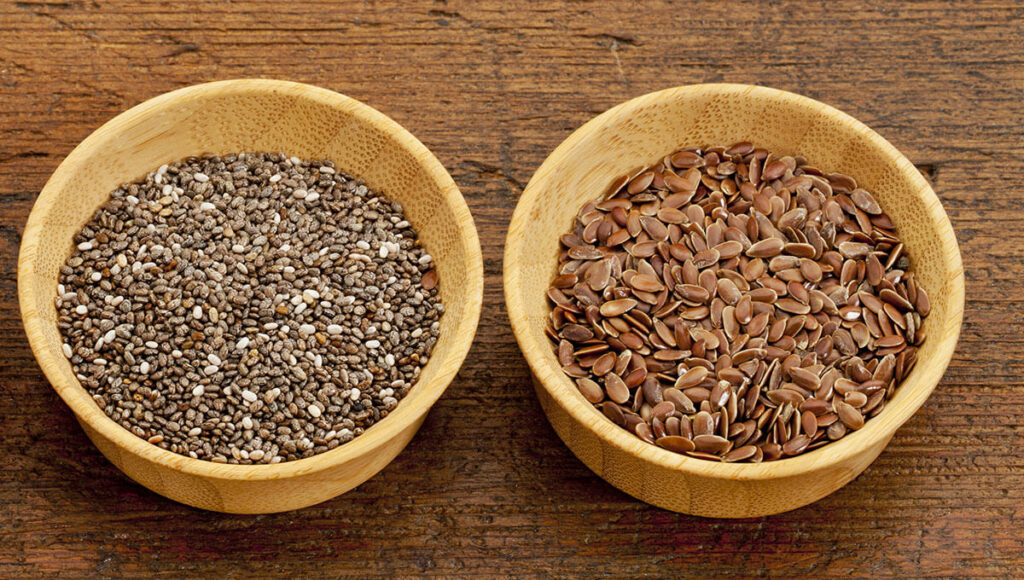Chia seeds and flax seeds are two popular superfoods that have gained recognition for their nutritional value and health benefits. Both seeds are rich in essential nutrients and offer various health-promoting properties. In this comprehensive guide, we will compare chia seeds and flax seeds in terms of their nutritional composition, health benefits, culinary uses, and potential side effects to determine if one is healthier than the other.
Nutritional Composition:
Chia Seeds: Chia seeds are packed with nutrients, including fiber, protein, omega-3 fatty acids, antioxidants, and minerals like calcium, phosphorus, and magnesium. They are also a good source of plant-based protein.
Flax Seeds: Flax seeds are similarly nutrient-dense, containing high amounts of fiber, protein, omega-3 fatty acids, lignans (a type of antioxidant), and minerals such as magnesium, manganese, and thiamine. Flax seeds are also rich in alpha-linolenic acid (ALA), a type of omega-3 fatty acid.
Health Benefits:
Chia Seeds: Chia seeds offer numerous health benefits. Their high fiber content promotes digestion and may help regulate blood sugar levels. The omega-3 fatty acids in chia seeds have anti-inflammatory properties and support heart health. Chia seeds are also known for their ability to absorb liquid and form a gel-like consistency, which can promote satiety and aid in weight management.
Flax Seeds: Flax seeds are renowned for their lignan content, which has antioxidant and estrogen-like properties that may help reduce the risk of certain cancers and improve hormonal balance. The omega-3 fatty acids in flax seeds contribute to heart health and have anti-inflammatory effects. Additionally, the fiber content in flax seeds supports digestive health and may help alleviate constipation.
Culinary Uses:
Chia Seeds: Chia seeds have a mild, nutty flavor and can be consumed raw or soaked. They are often added to smoothies, yogurt, oatmeal, and baked goods. When mixed with liquid, chia seeds form a gel-like consistency, making them suitable for creating puddings and thickening sauces.
Flax Seeds: Flax seeds have a slightly earthy flavor and can be consumed in whole or ground form. Whole flax seeds have a tough outer shell that is difficult to digest, so it is recommended to grind them before consumption. Ground flax seeds are often used as an ingredient in baked goods, added to smoothies, sprinkled on cereals, or used as an egg substitute in vegan recipes.
Side Effects and Precautions:
Chia Seeds: Chia seeds are generally safe for consumption, but some individuals may experience digestive discomfort if they consume large quantities without adequate hydration. It is essential to drink plenty of water when consuming chia seeds to prevent any digestive issues.
Flax Seeds: Flax seeds are safe for most people, but in rare cases, they may cause digestive issues or allergic reactions. It is important to consume flax seeds in moderation and ensure they are ground or chewed thoroughly to enhance digestion and nutrient absorption. Pregnant women and individuals with certain hormone-related conditions should consult a healthcare professional before consuming flax seeds due to their potential hormonal effects.
Which One Is Healthier?
- Both chia seeds and flax seeds offer an array of health benefits and can be incorporated into a healthy diet. The nutritional composition of these seeds is similar, with slight differences in specific nutrients. Ultimately, the choice between chia seeds and flax seeds depends on individual preferences and dietary needs. Some people may prefer chia seeds for their high fiber content and gel-forming properties, while others may opt for flax seeds for their lignan content and potential hormonal benefits.
- It is worth noting that variety is key when it comes to nutrition. Incorporating a variety of seeds and nuts into your diet ensures a broader spectrum of nutrients and health benefits. Both chia seeds and flax seeds can be part of a well-balanced diet that includes other nutrient-dense foods.
- In conclusion, chia seeds and flax seeds are both nutritious options that offer unique health benefits. Whether you choose one over the other or incorporate both into your diet, be sure to consume them in moderation and as part of a balanced eating plan. Consider your individual dietary needs, preferences, and any potential allergies or sensitivities when incorporating chia seeds or flax seeds into your meals. Enjoy the versatility and health benefits of these tiny powerhouses in your culinary creations!

